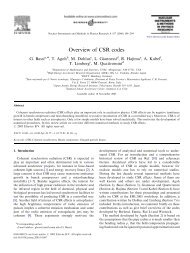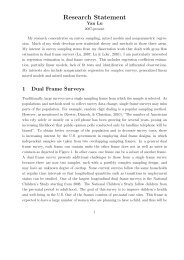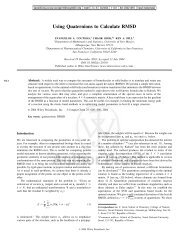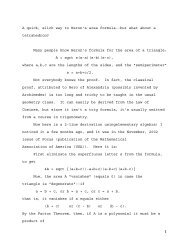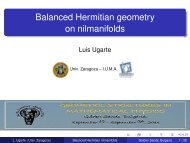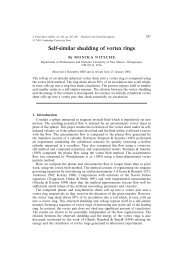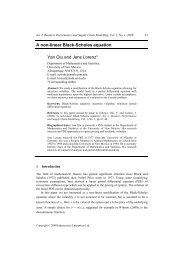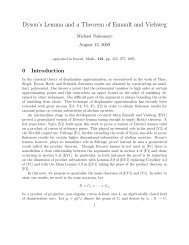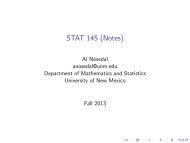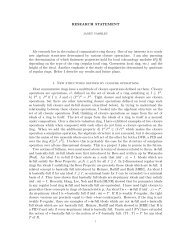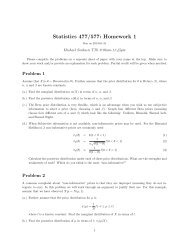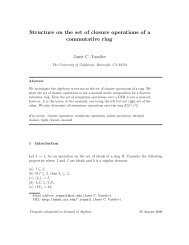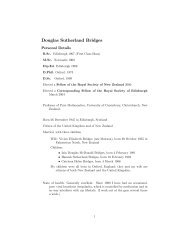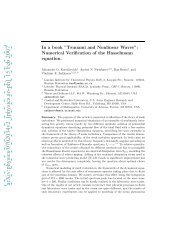OEO Office of Equal Opportunity - Department of Mathematics and ...
OEO Office of Equal Opportunity - Department of Mathematics and ...
OEO Office of Equal Opportunity - Department of Mathematics and ...
Create successful ePaper yourself
Turn your PDF publications into a flip-book with our unique Google optimized e-Paper software.
SOCIOLOGY 289<br />
social structure; social psychology <strong>of</strong> mass communication.<br />
{Offered upon dem<strong>and</strong>}<br />
338. City Life. (3)<br />
(Also <strong>of</strong>fered as HIST 418.) A study <strong>of</strong> the development <strong>of</strong><br />
urban spaces <strong>and</strong> urban lives from the 17th century, which<br />
considers the impact <strong>of</strong> political <strong>and</strong> cultural changes upon<br />
physical spaces <strong>and</strong> their impact upon modern lives.<br />
Prerequisite: 101. {Spring}<br />
345. Youth <strong>and</strong> Society. (3)<br />
An assessment <strong>of</strong> the creation <strong>and</strong> dynamics <strong>of</strong> childhood<br />
<strong>and</strong> youth in human societies. Consideration <strong>of</strong> historical<br />
<strong>and</strong> cross-cultural material; <strong>and</strong> issues such as deviance <strong>and</strong><br />
popular culture.<br />
Prerequisite: 101.<br />
350. Rural Society in Latin America. (3) Valdés<br />
Analysis <strong>of</strong> agricultural modes <strong>of</strong> production—including the<br />
relationship <strong>of</strong> crop, tenancy <strong>and</strong> l<strong>and</strong> ownership patterns <strong>and</strong><br />
social institutions stemming from them, from Spanish colonial<br />
times to the present. Effects <strong>of</strong> the commercial revolution <strong>and</strong><br />
agrarian reforms.<br />
Prerequisite: 101. {Offered upon dem<strong>and</strong>}<br />
351. The Urban Community. (3)<br />
The forms <strong>and</strong> development <strong>of</strong> urban community; demographic,<br />
spatial, functional <strong>and</strong> temporal patterns; metropolitan<br />
development <strong>and</strong> city-hinterl<strong>and</strong> relations.<br />
Prerequisite: 101. {Offered upon dem<strong>and</strong>}<br />
*414. Sociology <strong>of</strong> Corrections. (3)<br />
Study <strong>of</strong> the perspectives <strong>of</strong> corrections, its relationship to<br />
other criminal justice agencies, various forms sentencing<br />
<strong>and</strong> punishment, corrections administration <strong>and</strong> issues in the<br />
field. Visits may be made to several facilities.<br />
Prerequisites: 312, 313. {Fall, Spring}<br />
*415. Social Stratification. (3) Burris<br />
Structure <strong>and</strong> dynamics <strong>of</strong> class, status <strong>and</strong> power in society;<br />
social consequences <strong>of</strong> stratification.<br />
Prerequisite: 312 <strong>and</strong> 313. {Offered upon dem<strong>and</strong>}<br />
416. Sociology <strong>of</strong> Law. (3) Broidy<br />
Social science perspectives <strong>of</strong> the law, legal institutions <strong>and</strong><br />
the impact <strong>of</strong> law on behavior. Topics include theories <strong>of</strong> law<br />
<strong>and</strong> legality; comparative legal systems; lawyers, judges <strong>and</strong><br />
juries; <strong>and</strong> the use <strong>of</strong> social science in the courts.<br />
Prerequisites: 312 <strong>and</strong> 313. {Offered upon dem<strong>and</strong>}<br />
*418. Selected Topics in Criminology. (3 to a maximum<br />
<strong>of</strong> 6) ∆ Broidy, Wadsworth, Wood<br />
This course will explore in detail some aspects <strong>of</strong> research on<br />
the causes or characteristics <strong>of</strong> crime, such as juvenile delinquency,<br />
drug <strong>and</strong> alcohol-related behavior or child abuse.<br />
Prerequisites: 312, 313. {Offered upon dem<strong>and</strong>}<br />
*420. Race <strong>and</strong> Cultural Relations. (3) Gonzales, Lopez<br />
Comparative <strong>and</strong> structural analysis <strong>of</strong> intergroup relations in<br />
the United States <strong>and</strong>/or other countries <strong>and</strong> regions.<br />
Prerequisite: 101 <strong>and</strong> 216. {Offered upon dem<strong>and</strong>}<br />
ARTS AND<br />
SCIENCES<br />
371. Classical Sociological Theory. (3) Burris, Fiala,<br />
Huaco, Valdés<br />
The study <strong>of</strong> 19th century sociological theory, with particular<br />
emphasis on Marx, Durkheim <strong>and</strong> Weber.<br />
Prerequisite: 101. {Fall, Spring}<br />
381. Sociological Data Analysis. (3) Fiala, Roberts, St.<br />
George<br />
An introduction to the basic statistics (both descriptive <strong>and</strong><br />
inferential) employed in the analysis <strong>of</strong> quantitative sociological<br />
data.<br />
Prerequisites: 280. {Fall, Spring}<br />
389. Latin American Thought I. (3)<br />
(Also <strong>of</strong>fered as HIST, RELG, PHIL 389.) Pre-Columbian<br />
thought through independence ideologies. {Offered upon<br />
dem<strong>and</strong>}<br />
390. Latin American Thought II. (3)<br />
(Also <strong>of</strong>fered as HIST, RELG, PHIL 390.) Positivism through<br />
contemporary thought. {Offered upon dem<strong>and</strong>}<br />
398. Special Topics in Sociology. (3, no limit) ∆<br />
Prerequisite: 101. {Offered upon dem<strong>and</strong>}<br />
399. Advanced Undergraduate Workshop in Sociology.<br />
(3) Hood, Coughlin<br />
An undergraduate seminar reviewing selected issues in sociology.<br />
This is the first <strong>of</strong> two courses in the sociology honors<br />
program. The course focuses on sharpening analytical skills<br />
<strong>and</strong> developing research papers <strong>and</strong> proposals.<br />
400. The Welfare State. (3) Coughlin<br />
A historical <strong>and</strong> cross-national comparative study <strong>of</strong> the welfare<br />
state. How it functions <strong>and</strong> its present problems.<br />
Prerequisite: 200. {Spring}<br />
412. Sociology <strong>of</strong> Police <strong>and</strong> Social Control. (3) Wood<br />
Study <strong>of</strong> the relationship between society <strong>and</strong> law enforcement<br />
agencies, including the societal context <strong>of</strong> policing <strong>and</strong><br />
how law enforcement impacts society. Discussion <strong>of</strong> law<br />
enforcement practices, training <strong>and</strong> management; the interface<br />
<strong>of</strong> police <strong>and</strong> communities; historical <strong>and</strong> contemporary<br />
models <strong>of</strong> policing; <strong>and</strong> efforts at police reform.<br />
Prerequisites: 312, 313. {Fall, Spring}<br />
421. Sociology <strong>of</strong> Education. (3) Fiala, Lopez<br />
Structure <strong>and</strong> functioning <strong>of</strong> educational institutions in the<br />
United States <strong>and</strong> other societies.<br />
Prerequisite: 101. {Offered upon dem<strong>and</strong>}<br />
422. Sociology <strong>of</strong> Religion. (3) Wood<br />
(Also <strong>of</strong>fered as RELG 422.) Study <strong>of</strong> belief, commitment,<br />
<strong>and</strong> practice within religious <strong>and</strong> spiritual traditons <strong>and</strong> institutions,<br />
with a focus on contemporary United States, Latin<br />
America, <strong>and</strong> the Middle East.<br />
Prerequisite: 101, RELG 263 or 264. {Spring}<br />
423. Gender <strong>and</strong> Crime. (3) Broidy<br />
This course will outline similarities <strong>and</strong> differences in <strong>of</strong>fending<br />
patterns across males <strong>and</strong> females <strong>and</strong> discuss various<br />
explanations for these differences. Discussions will also<br />
focus on the dynamics <strong>of</strong> female <strong>of</strong>fending, the formal social<br />
control <strong>of</strong> female <strong>of</strong>fenders <strong>and</strong> the role <strong>of</strong> women in the correctional<br />
system.<br />
Prerequisite: 312 <strong>and</strong> 313.<br />
424. Race, Class <strong>and</strong> Crime. (3) Lopez, Wadsworth<br />
This class will examine the relationships between race,<br />
ethnicity, socio-economic status <strong>and</strong> involvement in criminal<br />
behavior, focusing on the influence <strong>of</strong> structural, cultural <strong>and</strong><br />
historical influences. We will also explore contemporary criminal<br />
justice issues pertaining to race <strong>and</strong> class.<br />
Prerequisite: 312 <strong>and</strong> 313.<br />
425. From Youthful Misbehavior to Adult Crime. (3)<br />
Broidy, Wadsworth<br />
Causes <strong>and</strong> consequences <strong>of</strong> <strong>of</strong>fending at various stages in<br />
the life course, focusing on the ways in which adolescent <strong>and</strong><br />
adult roles, responsibilities <strong>and</strong> opportunities shape aggregate<br />
<strong>and</strong> individual level patterns <strong>of</strong> involvement in juvenile<br />
delinquency <strong>and</strong> adult criminality.<br />
Prerequisite: 312 <strong>and</strong> 313.<br />
426. Drugs, Crime <strong>and</strong> Social Control. (3) Wadsworth<br />
Study <strong>of</strong> the development <strong>of</strong> social policies concerning illicit<br />
substance use; its impact on social behavior; strategies for<br />
prevention <strong>and</strong> intervention with substance use; investigation,<br />
adjudication <strong>and</strong> supervision <strong>of</strong> drug <strong>of</strong>fenders; <strong>and</strong> the<br />
relationship between criminal justice, education, public health<br />
<strong>and</strong> government policies.<br />
Prerequisites: 312, 313.<br />
UNM CATALOG 2006–2007 Symbols, page 611.



